Are you feeling really tired of changing your baby’s sheets every single morning because she always pees through her diaper at night?
Or perhaps frustrated because you feel like you’ve tried everything but your baby still wakes up soaking wet after peeing through his pajamas again?
I know exactly how you feel.
For over a YEAR (from 6 months to 18 month), my baby woke up completely soaked from head to toe after peeing through his diaper night after night.
Every morning, we had to add an extra load of laundry and a power shower to our routine because he always woke up sopping wet. 🤦
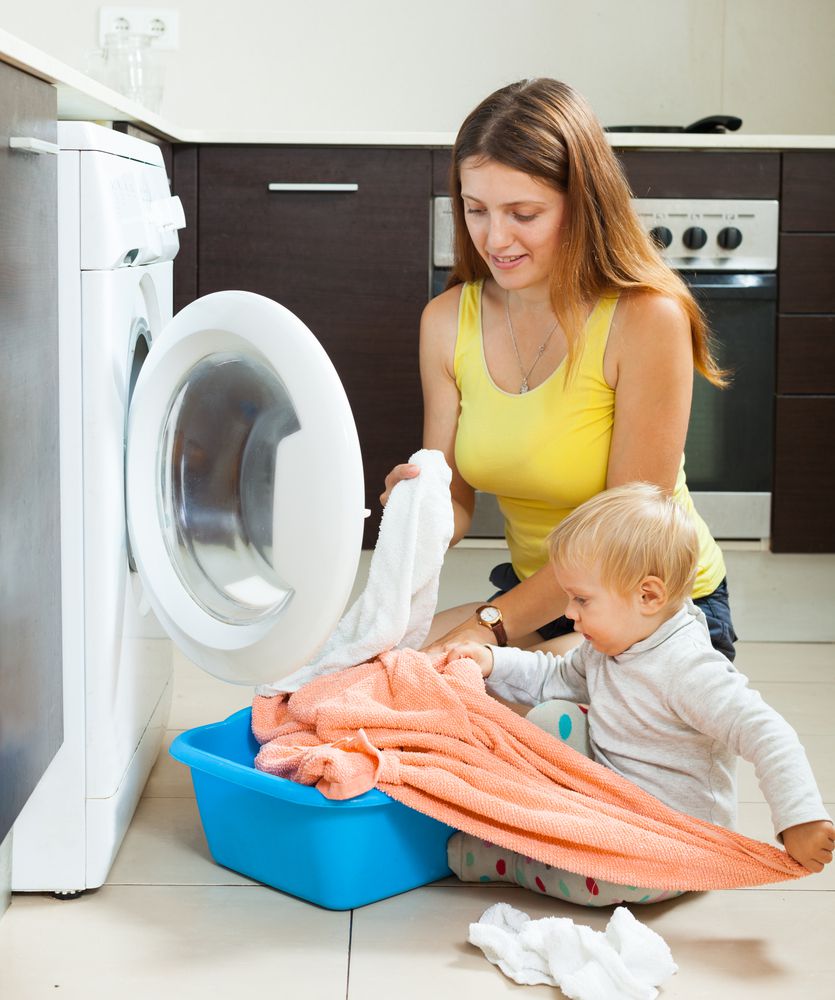
So trust me when I say that I know how frustrating and exhausting this is for you.
Because we struggled with this for so long, I tried out every method I could find on how to keep our baby from peeing through his diaper at night.
I decided to put together the top 13 best-kept secrets I found on my journey to finally stopping overnight diaper leaking.
Hopefully these will help you too!
DISCLOSURE: Piece of Cake Parenting is a participant in the Amazon Services LLC Associates Program, an affiliate advertising program. As an Amazon Associate, I earn from qualifying purchases. Read more about these links in my disclaimer policy.
Jump To:
🤷♀️ Why does my baby keep peeing through their diaper? 🙅♀️ How to stop your baby from peeing through diapers overnight 🤔 What can you do if your baby is constantly leaking through diapers at night? 💭 Final Thoughts
Why does my baby keep peeing through their diaper?
If you’re like me, you probably ask this question on a very regular basis.
I figured if I could discover what was causing these bedwetting problems, I could finally find the solution to overnight diaper leaking.
Here are four of the most likely reasons why babies regularly pee through their diaper overnight:
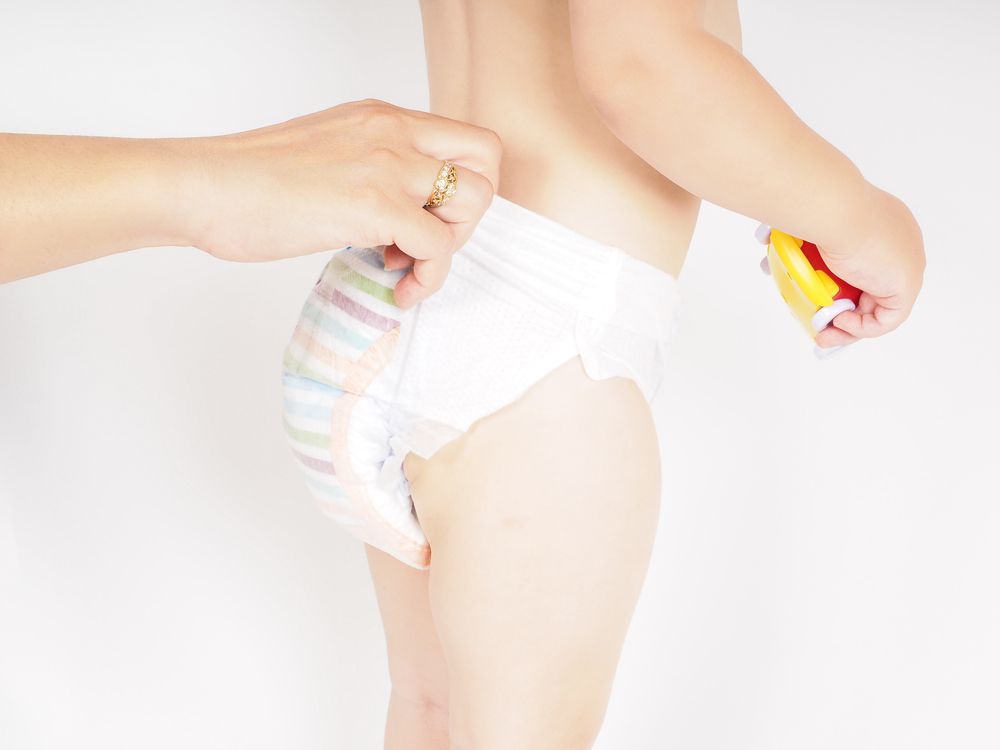
1. Your baby’s body doesn’t make enough antidiuretic hormone (ADH).
Antidiuretic hormone (ADH) is the hormone in our bodies that tells us to decrease urine production.
In adults, ADH levels are increased overnight so you’re not constantly running to the bathroom all night long.
But generally babies’ ADH levels are lower and urine production stays high all night long. If your baby has lower ADH levels and a particularly full bladder, they’re much more likely to leak through their diaper before morning.
The convenient, affordable, eco – friendly alternative to diapers!
2. Your baby is in between diaper sizes.
When your baby is between sizes, neither the smaller or bigger size fits juuuust right.
Until they’ve fully grown into their new size, you’re more likely to see overnight diaper leaking for a while.
3. Your baby moves around a lot.
If your little one moves around a lot overnight, their diaper is constantly shifting and rearranging.
Since the diaper isn’t staying snug in one spot, this increases the chances of overnight diaper leaking for your baby.
4. Your baby sleeps on their stomach.
Stomach sleeping also increases the odds of leaking through diapers overnight.
Stomach sleeping seems to put pressure in different places on your baby’s diaper and increases the odds of your baby peeing through their diaper.
How to Stop Your Baby From Peeing Through Diapers Overnight
Okay, now you know a few of the most common reasons WHY your baby is peeing through her diaper overnight, and hopefully feel relieved that they aren’t on a mission to destroy your morning routine with extra loads of laundry and emergency baths before daycare. 😉
Now let’s dive into 13 of the top secrets for stopping overnight diaper leaking once and for all:
1. Change Your Baby’s Diaper Right Before Bed
Always make sure that your baby goes to bed with a fresh diaper.
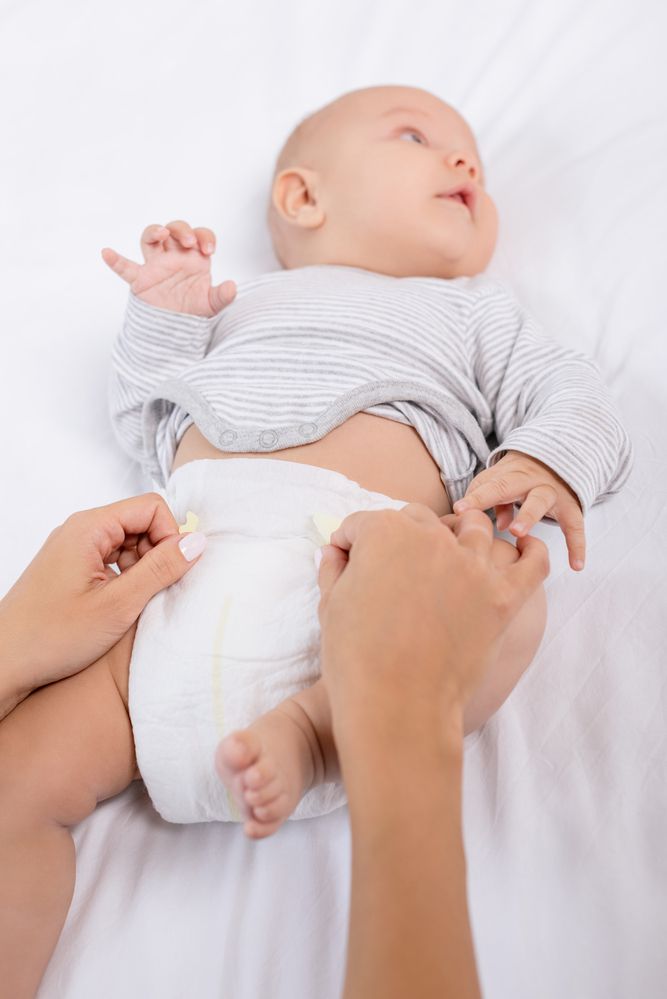
A dry diaper will help your baby to feel more comfortable and sleep better and will also prevent your baby from peeing through diapers at night because it can absorb as much as possible when your baby goes to the bathroom.
2. Use Overnight Diapers
Overnight diapers are specifically designed with ultra-absorbent layers to keep your baby dry for 12+ hours.
They usually cost a little more than regular diapers because they are more absorbent, but are definitely worth it for anyone struggling with leaking through diapers overnight.
We typically see a LOT more problems when we forget to stock up on our favorite overnight diapers before bedtime.
3. Use a Larger Diaper at Night
Overnight diaper leaks happen when your baby is peeing too much for their diaper to absorb. So if your baby is suddenly leaking through diapers a lot more, try going up a size overnight.
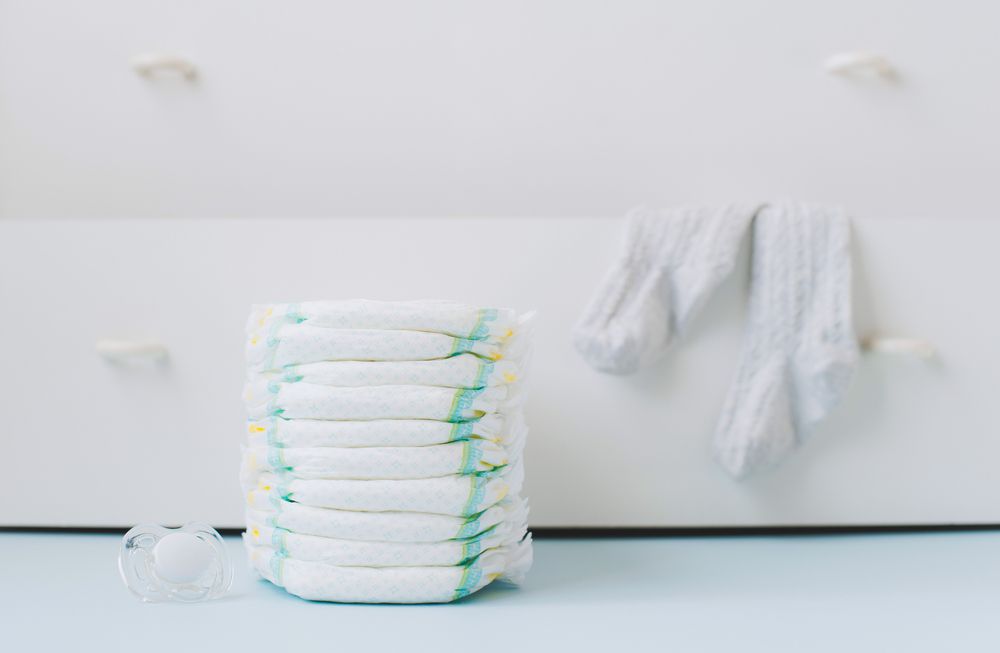
This helps to give more space (and more absorption) for your baby overnight.
4. Change Diaper Brands
Every brand fits your baby and absorbs urine a little differently.
If your baby is regularly peeing through pajamas overnight, try out a few different brands. And remember, just because one brand has been working doesn’t mean it will always work, so experiment a little to find what’s right for your baby right NOW.
5. Use Cloth Diapers
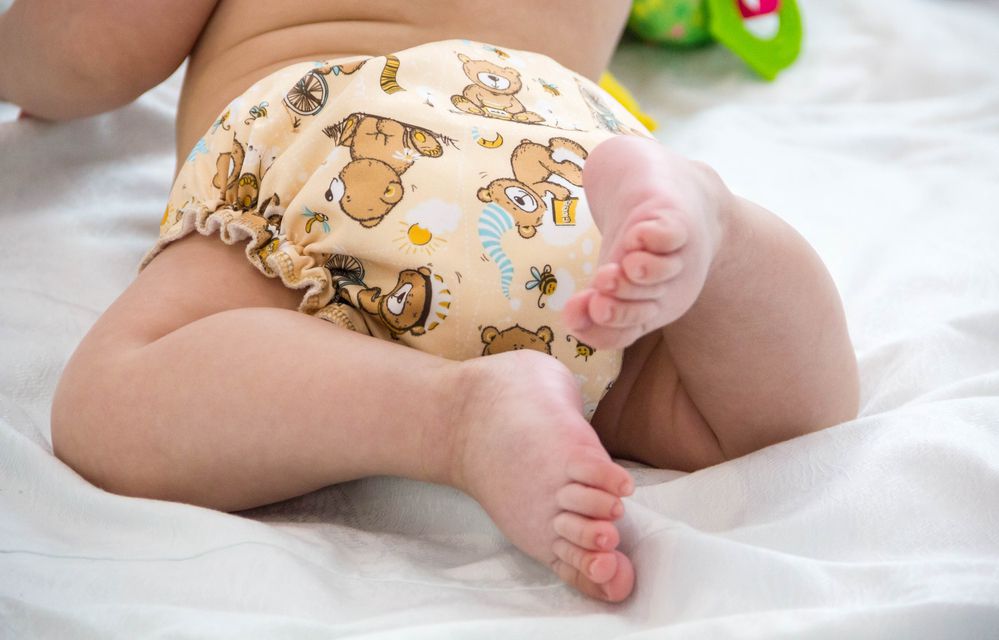
Cloth diapers are known for being more absorbent than disposable diapers, so switching to cloth diapers overnight can be super helpful for stopping your baby from peeing through their diaper every night.
6. Use a Diaper Liner Across the Top of the Diaper
Again, when your baby is leaking through their diaper, it’s because they has too much urine for the diaper to absorb.
An easy way to fix this is to add a diaper liner across the top of the diaper.
Pay attention to whether your baby is always leaking through the front or the back and then add the diaper liner on whichever side is always wet in the morning.
7. Line Your Baby’s Diaper with a Pad
Another creative way to stop your baby from peeing through his diaper at night is to add a pad to his diaper before bedtime.
This gives another super absorbent to your baby’s diaper. Once it leaks through the pad, it will go to the mostly-dry diaper and decrease the odds of peeing through the diaper and soaking your baby’s pajamas and bed sheets.
8. Use Peejamas Overnight
Peejamas are pajamas that are specifically designed with a built-in highly absorbent cloth diaper.

Although they are technically designed to help toddlers master overnight potty training, they have been our absolute favorite tool for stopping overnight diaper leaks and the only thing we’ve tried that have really worked.
After we put on our baby’s overnight diapers, we put on a pair of our Peejamas. When he goes to the bathroom overnight, anything that leaks through the diaper is soaked up by the built-in cloth diaper and his pajamas and bed sheets finally stay wet all night long.
Check out my honest Peejamas review will all of the pros and cons for us.
9. Point Boy Parts Downward
This is an important step that lots of parents forget.
If your baby boy is peeing through his diaper at night, always make sure to point his boy parts down before strapping up his diaper.
This makes sure that he is peeing toward the most absorbent part of the diaper when he goes to the bathroom instead of sending everything up over the top of his diaper.
10. Adjust the Diaper
Adjusting your diaper a little can also help to prevent overnight diaper leaking.
For bedtime diapers, we always make sure to pull the diaper forward just a little so it sits higher on our baby’s stomach. This helps absorb more in the front, since that’s where our diaper leaks usually happen.
We also adjust our straps slightly. Instead of taping it directly across his hips, we tape it at a slightly upward angle to put more pressure on these areas and help absorb more liquid if he has a full bladder overnight.
Also, take a few seconds to make sure that the fabric by your baby’s legs is pulled out and nothing is bunched up.
This area typically gets a little folded during diaper changes, but straightening everything out helps your diaper to be as absorbent as possible and is especially helpful if your baby keeps peeing through the side of the diaper.
11. Change Diapers During Overnight Feedings or Wakings
It’s generally safe for your baby to sleep with a wet diaper without worrying about a diaper rash (although if your baby already has a rash or is prone to rashes, ask your doctor if you should wake up your baby when she is wet).
However, if you struggle with diaper leaking, I highly recommend that you check your baby’s diaper and change it anytime your baby wakes up for a feeding or is fussing overnight.
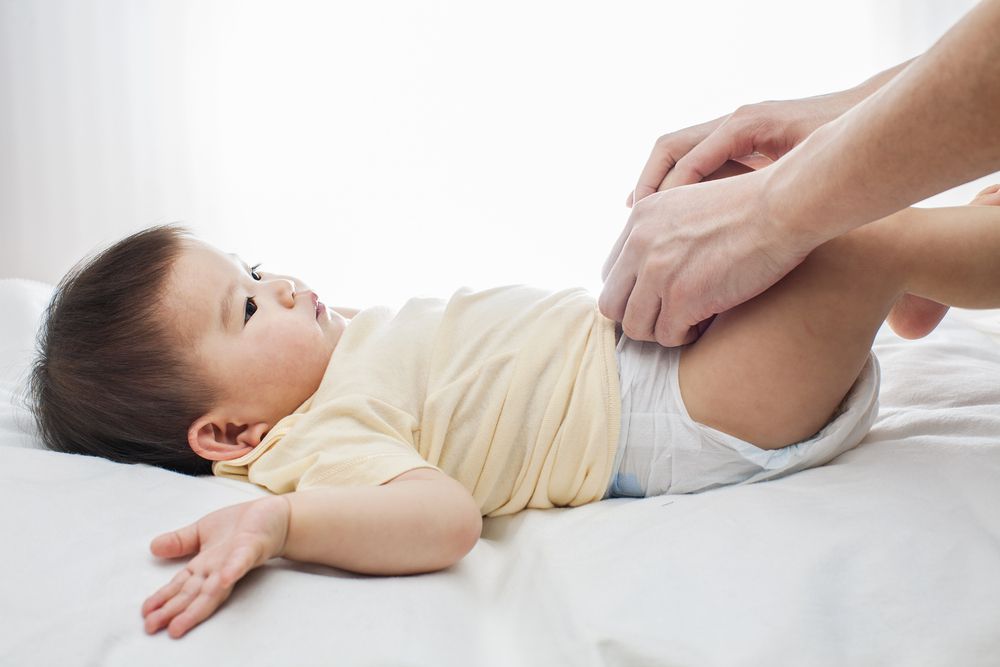
This gives you a fresh diaper to make it through the rest of the night and will help your baby to fall asleep faster since a dry diaper is much more comfortable than a wet one.
12. Encourage Back Sleeping
Babies that prefer belly sleeping are much more likely to leak through their diapers than back sleepers.
All of that extra pressure on the front of their diaper seems to lead to more problems with peeing through diapers overnight.
As much as you can, encourage your baby to sleep on their back. This is generally a safer sleep habit, especially while your baby is younger, and will help decrease extra laundry and baths after a wet morning.
13. Limit Certain Liquids at Night
I’m not a big fan of limiting liquids, so I offer this tip with caution. If your baby is nursing or taking a bottle or asking for water, I think you should give it to your child.
Being thirsty is just going to make your baby feel miserable and sleep worse, and could lead to dehydration.
However, you can certainly limit certain types of liquids at bedtime, especially when you’re struggling with super wet overnight diapers.
Limit sugary drinks in the evenings (or all the time since your baby doesn’t need juice or sugary drinks) since these extra beverages might increase overnight bed wetting.
What can you do if your baby is constantly leaking through diapers at night?
While you test out these different options to see what’s best for your baby, here are a few ideas to make it less of a pain the next time your baby pees through her diaper.
1. Add a Blanket or Mattress Pad Under Your Baby
This gives an extra layer between your baby and the bed.
When your baby leaks through their diaper and pajamas overnight, you can change PJs and switch out the extra blanket without having to wash all of the sheets too.
Pro-Tip: If your baby is less than 12 months old, it is not recommended that your baby sleep with anything extra in the bed. If using an extra blanket or mattress pad, make sure that it is tight fitting or put it under the main sheet and your baby can’t pull it up and wrap it around their head.
2. Layer Your Baby’s Mattress
If you have an extra crib mattress, double up to save some time on overnight changings.
Mattress. Sheets. Mattress. Sheets. Baby.
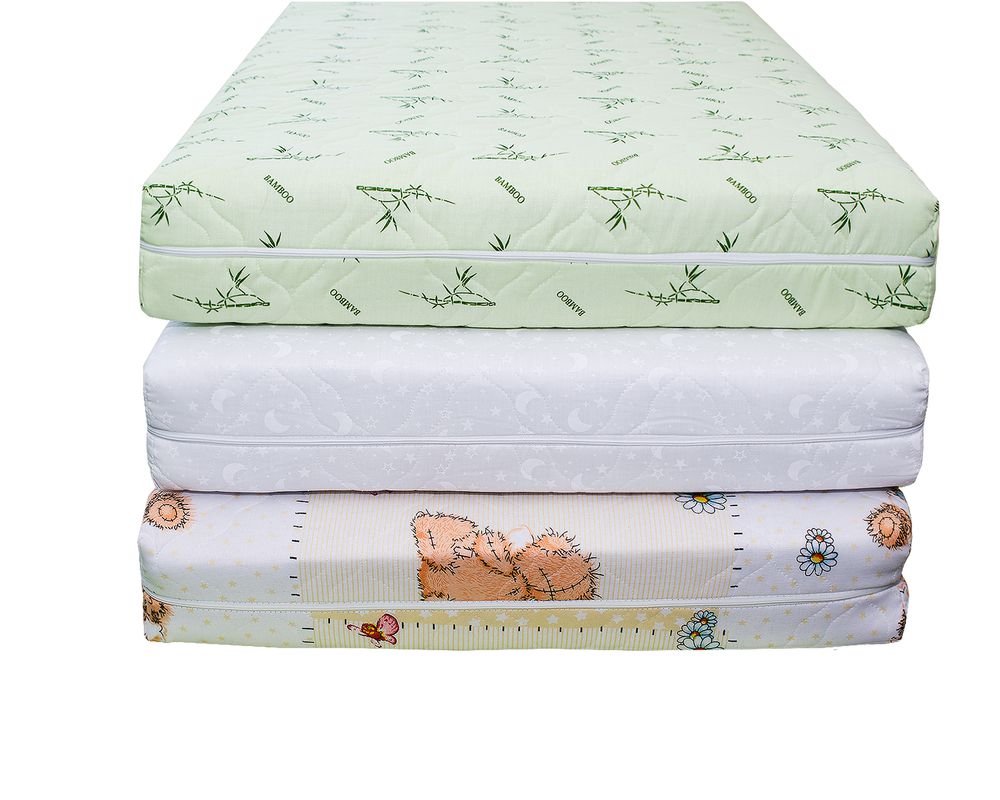
If your baby leaks through pajamas overnight, you can take off the extra mattress and already have a clean layer underneath for the rest of the night.
3. Skip Bed Sheets or Pajamas for a While
If you live in a warm climate and know that your baby won’t be too cold overnight, you can have your baby sleep without pajamas to make overnight diaper changes easier and limit extra laundry if your baby soaks through their diaper.
You can also try to go without bed sheets for a little while and then just wipe off your baby’s mattress during overnight diaper changes and in the mornings as needed.
4. Change Your Baby When You Go To Bed
If your baby is regularly peeing through everything overnight and doesn’t usually wake up for a diaper change, try an extra diaper change when you go to bed.
We never did this, because our baby is NOT happy when we wake him up, but this has worked really well for other babies I’ve worked with who stay fairly sleepy during this extra diaper change and then drift right back to bed.
5. Invest in a Washable Mattress
Mattresses can get pretty gross if your baby is constantly peeing through them night after night.
I highly recommend checking out these mattresses, which are 100% machine washable and might be the coolest things since sliced bread.
Try our 100-night home trial at NewtonBaby.com!
Final Thoughts:
Dealing with diapers leaking through every single night is frustrating. But you’re not destined to a sopping wet baby and unlimited piles of laundry forever.
Experiment with these tips to see which are the most helpful for finally getting rid of your overnight diaper leaking.

Isnt there a typo at the end of this interesting article that states that the bed can now stay wet all night. I believe you meant to say dry instead of wet.
Thank you so much for pointing that out! 🙂
Just a note on adding any blanket or mattress pad under your sheets, it can make your mattress too soft and cause suffocation on younger babies. They make mattresses very firm for this reason. You shouldn’t be adding anything to your babies mattress under a year.
Great reminder! Of course you want to take in consideration your child’s age and not add any items or too many items that would soften up the mattress significantly or cause it not to pass the mattress test.
Great article. Just noticed a typo, when you said “ his pajamas and bed sheets finally stay wet all night long.”
Thank you!!